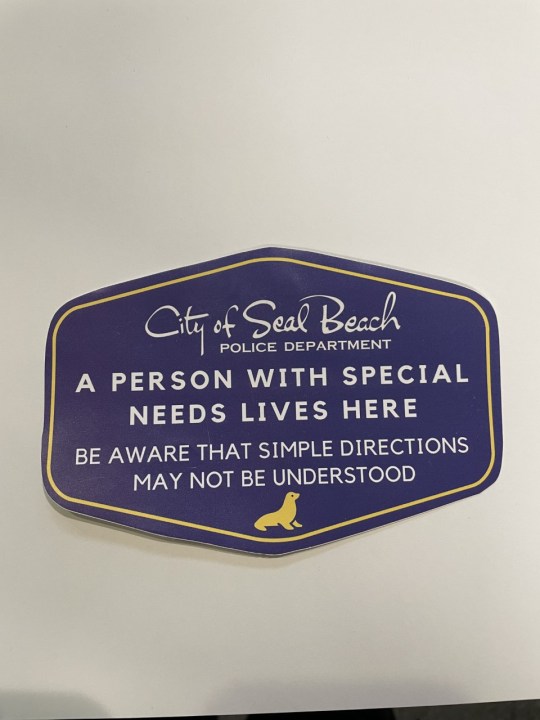Stickers help police respond to people with special needs
- People with special needs often find police encounters stressful
- Special needs stickers inform officers and help them change their approach
- Police need more training on how to approach people with special needs
(NewsNation) — Encounters with police can be stressful for anyone, but they can be particularly difficult for individuals on the autism spectrum. That’s a lesson that police in Hazelwood, Missouri learned firsthand.
“We had a young man in our town that whenever we would respond to a call there, and he was [on] spectrum, if he heard the lights and sirens, it was a trigger for him that made his condition worse,” said Sergeant Tim Benning, who serves in the Hazelwood Police Department.
To prepare for situations like that one, the department started issuing stickers or decals to community members to place on their residences to identify themselves as having special needs.
In one instance, Hazelwood officers were called to a group home and saw the sticker, which helped inform police one of the residents was often agitated by the sight of officers, Benning described. The sticker and the data they collected on the resident informed their response, seeing the person’s agitation as a medical issue rather than defiance of their authority.
“So instead of escalating that situation to where an arrest was made or a charge of failure to comply or interference…you know how to deal with that person on a different level,” Benning said.
The department has been issuing stickers for the last five years with a range of stickers for different needs. When people apply for stickers, they’re also able to provide information about their personal situation to the police so authorities can be informed.
A diabetic person may, for example, be able to alert police about how they can access a key to enter the home if they are having an emergency and can’t get to the door.

“When you see the sticker, and the dispatcher brings up the information, the dispatcher’s giving you the rundown on everything, but it will pinpoint what that individual’s special needs are,” he said.
The idea has started to spread in the law enforcement community. Police in Seal Beach, California, started using special needs stickers two years ago, after Public Information Officer Julia Clasby first read about a Texas department using stickers.
But she also read social media comments objecting to the Texas department’s use of the stickers because they could lead to stigma against people who used them.
“[They said] you’re trying to ostracize these people, you’re labeling them, the police should be able to identify people with special needs without a sticker,” Clasby said.
So she reached out to Sergeant Joe Garcia, whose son is autistic, to look into the feasibility of the stickers.
In his research, he spoke with therapists who told him it was an encouraging idea.
“They said, yeah, that is without a doubt, probably one of the greatest ideas for families who have someone [on the spectrum],” Garcia said.
The response from the Seal Beach community has largely been positive, Clasby noted.
In addition to offering stickers to residents, Garcia more recently worked with the department to develop sensory kits containing items like fidget spinners and kitchen timers designed to help accommodate individuals who have autism.
“Everything in there is just to help soothe, help calm that person down,” he said.
Even with the stickers, police still need to know how to respond, Garcia said. The Seal Beach department worked with a local therapist to conduct briefings with officers on how to communicate with people on the spectrum.
Clasby did note, however, that one shortcoming of current police training is that they get very little education on how to approach people who have special needs.
“In the police academy we are provided very minimal — 4 to 8 hours of training that would even touch on special needs,” she said.
For Benning, the stickers and corresponding information give officers the first bit of information they need to make encounters with the police go smoother.
“It kind of puts you down the right road of how best to treat the situation,” he said.









